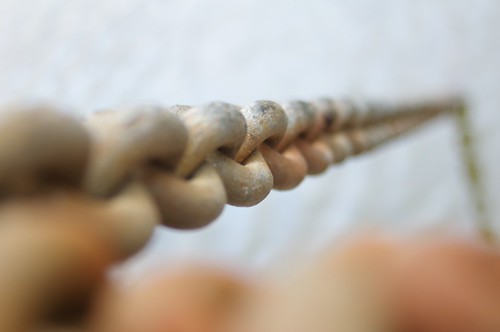connect / disconnect
 Over the course of the last year, it's become increasingly important to me to find a way to articulate what and why I do what I do as an artist. (What and why I do what I do in life is an exploration that would probably be best begun under some professional guidance, so for now I'm sticking to the art.)
Over the course of the last year, it's become increasingly important to me to find a way to articulate what and why I do what I do as an artist. (What and why I do what I do in life is an exploration that would probably be best begun under some professional guidance, so for now I'm sticking to the art.)I've also become enamoured of the concept of interrogating your ideas, and those of your collaborators. The work doesn't end with that stroke of inspiration, that light bulb moment - that's where it starts. Everything prior to that is just prologue.
The idea I've been interrogating of late - and I do feel like I've been interrogating it: pushing it up against the wall, roughing it up just a bit, throwing that sharp, bright light in its face and asking it where it was last Tuesday - is the summation of what I do as a director. What is it that I'm interested in? What is my work about? What am I driving at? What's important to me in a collaboration? And why, why, why, why, why?
What I've come up with is something that is thrown into sharp relief by its absence as much as its presence. In fact, I wonder if this thing and the void created when it's not around are of a piece - two sides of the same coin - each as influential as the other. I'm a very process-focused director. I feel that artistic process is equal to, if not more important than product. Maybe it's because my theatre company is so focused on renewal of artist and audience. Maybe it's because the work of which I've been most proud has been created in that space - where collaboration, communication, honesty are the high court that guides our decisions.
Connection - this is what I keep coming back to thematically in my work - both the process and the product. I've been toying with the phrase "anthropology of connection" lately as well. What I think holds water about that particular way of putting it is the idea of study, discipline, uncovering patterns, drawing conclusions, comparing, contrasting, juxtaposing different methods and circumstances and histories and viewpoints. And the fact that we're not dealing with artifacts - nothing is static or removed about the idea of human connection - it's happening now and now and now and now and shifting in the breaths between.
I suppose it's actually impossible, though, to completely separate the idea of connection in my work from the idea of connection in my life. Likewise, disconnection is equally and inextricably enmeshed in how I negotiate the world. The insidious thing about disconnection - for me anyway - is that it's sneaky. It can creep up behind you and shove your face in the mud and you might not know that's what's happening until your pulling yourself back out, wondering why you're gasping for air, filthy, and exhausted.
Or maybe it's like being asleep - that might be closer to what I've been feeling - the idea of being asleep and not knowing you're asleep until you start to shake yourself awake. When the connection starts to come back, you feel its absence so acutely that you wonder how you lived without it for so long.
That's what I'm interested in exploring - that visceral, reaching, hungry feeling and how we wrap our minds and our bodies around it, and the consequences of going without it for too long. It feels to me simultaneously the best and worst thing about the human condition. It's that paradox that I think keeps pulling me back into these questions in my work and in my life - which I guess can't be compartmentalized as neatly as I might like after all.
image courtesy of flickr's creative commons
Comments
Post a Comment